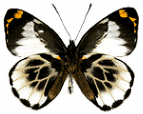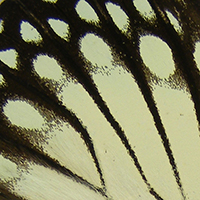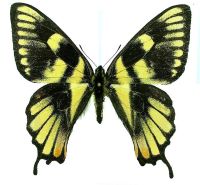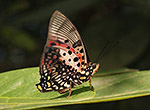-
wollastoni

- Site Admin

- Posts: 693
- Joined: Fri Mar 18, 2022 9:51 am
Re: Papilio antimachus - female or male
by wollastoni » Thu Jul 03, 2025 6:36 pm
Thomas : you should write a book about your entomological adventures in Kivu one day !
-
Cabintom

- Posts: 280
- Joined: Sat Jun 04, 2022 1:54 pm
Re: Papilio antimachus - female or male
by Cabintom » Thu Jul 03, 2025 3:17 pm

Female on the bottom.
-
wollastoni

- Site Admin

- Posts: 693
- Joined: Fri Mar 18, 2022 9:51 am
Re: Beautiful Ab. P. canadensis
by wollastoni » Thu Jul 03, 2025 2:00 pm
A lifer !
-
boghaunter1

- Premium Member - 2025

- Posts: 298
- Joined: Mon May 23, 2022 7:16 pm
Re: Beautiful Ab. P. canadensis
by boghaunter1 » Wed Jul 02, 2025 9:15 pm
I just took this ab. P. canadensis off the spreading board today. Following are photos of the dorsal & ventral wing surfaces & a comparison to a "normal" fm. Canadian Tiger Swallowtail collected on the same date (30 May 2025) & location.
John K.
-
Chuck

- Posts: 1441
- Joined: Mon May 23, 2022 2:30 pm
Re: Tiger Swallowtails of NY: Finger Lakes, Part II
by Chuck » Wed Jul 02, 2025 5:42 pm
Now on to the MST (P. solstitius) season...
May and June in the Finger Lakes region of NY have been horrible. Storms, tornados, flooding, deaths. Over the past month, four freak days hit 90F (32C) which were terminated by thunderstorms. Four days were typical nice summer days. The rest were rainy, cold, and windy. What a garbage summer so far.
02 July 2025: 74F/ 23C, winds NW 8, 100% sun
Observed: zero
It's now the very beginning of MST (solstitius) season, typically. Being the first decent day, I checked the shoreline and side roads of Wayne Co. NY near Lake Ontario. Zero. iNat has observations in the Ithaca NY area, but not here. The preferred nectaring source, milkweed, is a good week from full bloom. I wonder...does the full bloom of milkweed with the emergence of MST coincide due to the same factors? Or does MST somehow "know", in real-time as if checking Weather Channel, it is too early to emerge and nectar, despite the calendar date?
-
wollastoni

- Site Admin

- Posts: 693
- Joined: Fri Mar 18, 2022 9:51 am
Papilio antimachus - female or male
by wollastoni » Wed Jul 02, 2025 11:46 am
Here are some recent live photos by Sui Fai Pun that clearly show the differences between males and females:
Female : Male : Pictures taken in June 2025 in Uganda.
Main differences :
- females have rounded forewings
- females lacks the three white spots on the underside.
Be careful, some fraudulent sellers “cut” the forewings of males to round them like those of females. The absence of white spots is therefore a better indicator. So always check the underside !
Here is an example of a fake female with cut wings : https://archive.insectnet.com/thread/63 ... hus-female
I hope it will help.
-
Dinosaur2004

- Posts: 2
- Joined: Sat Jun 28, 2025 10:42 am
Re: Any French guiana entomologist
by Dinosaur2004 » Wed Jul 02, 2025 10:04 am
I thought more of a hobby entomologist. I will be there at the end of July for 15 days in camp like 60km west from Cayenne
-
dogeared

- Posts: 2
- Joined: Mon Jun 30, 2025 4:51 pm
Re: ID help with strange scorpion thing
by dogeared » Mon Jun 30, 2025 6:28 pm
-
livingplanet3

- Premium Member - 2025

- Posts: 720
- Joined: Tue May 24, 2022 4:55 pm
Re: ID help with strange scorpion thing
by livingplanet3 » Mon Jun 30, 2025 5:43 pm
https://en.wikipedia.org/wiki/Heterotoma_planicornis
https://www.naturespot.org/species/hete ... lanicornis
-
dogeared

- Posts: 2
- Joined: Mon Jun 30, 2025 4:51 pm
ID help with strange scorpion thing
by dogeared » Mon Jun 30, 2025 5:11 pm
I've never seen anything like this before and can't identify it.
I was sitting outside here in Suffolk England, having a drink and it was there underneath my glass when I picked it up.
It has six green legs plus two 'claw like' structures that it was waving around, they had a fat part then short thin jointed extensions. No actual pincers. It appears to have a wing case. It was about 12mm long.
Thank you
https://photos.app.goo.gl/Zy9b9Ffr9ExxMxYe9
https://photos.app.goo.gl/7sHe7BzB6J88qsMt7
-
livingplanet3

- Premium Member - 2025

- Posts: 720
- Joined: Tue May 24, 2022 4:55 pm
Re: Need help IDing gifted butterfly
by livingplanet3 » Mon Jun 30, 2025 2:47 pm
Thank you for pointing this out. This likely means that many of the specimens that I've seen labeled as palinurus, including ones in my own collection, are actually probably daedalus.adamcotton wrote: Mon Jun 30, 2025 9:50 am No it isn't. This is Papilio daedalus from the Philippines, a closely related but separate species...
-
wollastoni

- Site Admin

- Posts: 693
- Joined: Fri Mar 18, 2022 9:51 am
Re: Any French guiana entomologist
by wollastoni » Mon Jun 30, 2025 12:00 pm
Welcome here.
The few French Guianan entomologists that I know are working on Amazonian species only. They already have so much work studying their own fauna. I doubt they will be interested in entomo pins or European insects.
When and where do you go inside French Guiana ?
I will be there in November (Kaw, Saul and Belizon on the program).
-
adamcotton

- Global Moderators

- Posts: 1120
- Joined: Tue Mar 22, 2022 12:24 pm
Re: Need help IDing gifted butterfly
by adamcotton » Mon Jun 30, 2025 9:50 am
No it isn't. This is Papilio daedalus from the Philippines, a closely related but separate species. Note on the hindwing that the green band points directly at the 'eye spot' at the anal angle of the hindwing (inner edge below the tip of the abdomen), whereas in Papilio palinurus the green band ends above the 'eye spot'. It seems that Wikipedia doesn't know that there are two separate species in their 'Papilio palinurus'.
This species is not protected and perfectly legal to own in the USA. Also it is worth mentioning that Papilio daedalus from the Philippines is the species often exhibited in butterfly houses. This species is bred in large numbers, whereas the true Papilio palinurus is not.
Adam.
-
livingplanet3

- Premium Member - 2025

- Posts: 720
- Joined: Tue May 24, 2022 4:55 pm
Re: Need help IDing gifted butterfly
by livingplanet3 » Mon Jun 30, 2025 4:17 am
Further info -
https://en.wikipedia.org/wiki/Papilio_palinurus
-
n73

- Posts: 1
- Joined: Mon Jun 30, 2025 2:14 am
Need help IDing gifted butterfly
by n73 » Mon Jun 30, 2025 2:55 am
I would like to ask for help with a specimen shown below. I was gifted it as a kid in the mid to late 2000s. It's about 4 or 5 inches (10 to 13 cm) across and did not come with any location/species info. Sorry about the hideous mounting; I didn't know any better and was just trying to keep it from being damaged by sliding around in the case.
Someone elsewhere on the internet suggested it may be Papilio palinurus. Is this ID correct? Also, can anyone advise (informally—not official legal advice I know) on whether I can own this legally in the US? I have done my homework before posting and it looks like P. palinurus is not CITES listed but is protected in Thailand and I of course have no idea where this particular specimen is from or whether there are other laws I need to be considering.
Thank you for reading!
n73
-
kevinkk

- Premium Member - 2025

- Posts: 536
- Joined: Mon May 23, 2022 5:06 pm
super speed pupa
by kevinkk » Sun Jun 29, 2025 3:42 pm
The first 21 larva were put into 2 different containers , they burrowed in as soon as they hit the substrate, which in itself is not something I have ever noticed, at least with other burrowing species.
Now- the weirdest part of all, is that after 5 days in the substrate, at room temperature, which is 72 at my house, all were fully formed pupa, and I
removed them from the substrate, the remaining larva are taking the time I normally associate with the time it takes for larva to form pupa, more
like 10 days. I've never experienced larva doing this.
Ok, I can see one logical possiblity, and that was that the larve were mature long enough in the sleeve wandering, that some of the time was used up.
Does that make any sense? But that wouldn't explain the remaining lethargic larva, or the reality that I looked for mature larva everyday.
-
Dinosaur2004

- Posts: 2
- Joined: Sat Jun 28, 2025 10:42 am
Any French guiana entomologist
by Dinosaur2004 » Sat Jun 28, 2025 11:44 am
-
boghaunter1

- Premium Member - 2025

- Posts: 298
- Joined: Mon May 23, 2022 7:16 pm
Re: Beautiful Ab. P. canadensis
by boghaunter1 » Fri Jun 27, 2025 6:26 pm
Thank you very much to everyone for your positive compliments on the recent LUCKY collection of this rare aberration. I wish that same luck would help in winning a lottery!..
By the way... in my area, the summer of 2024, was also a very hot, dry season with drought-like conditions interspersed with brief cooler temps & heavy sporadic rain showers. Remember, last year, all the smoke from massive forest fires in W. Canada drifting far S. into the USA, causing breathing problems for millions! When the larva of this aberrant would have pupated in July-August '24, temps, for many days, reached well above 30 C = 86 F, with a number of days exceeding 34 C = 94 F... certainly favorable environmental conditions that may have contributed to the '25 production of this interesting aberration (as outlined by Adam Cotton above).
John K.
-
kevinkk

- Premium Member - 2025

- Posts: 536
- Joined: Mon May 23, 2022 5:06 pm
Re: Beautiful Ab. P. canadensis
by kevinkk » Fri Jun 27, 2025 4:47 pm
-
Paul K

- Posts: 231
- Joined: Mon May 23, 2022 6:44 pm
Re: Beautiful Ab. P. canadensis
by Paul K » Fri Jun 27, 2025 2:39 pm
And what are the odds that such unique specimen has had developed a „blister” ?!
Congrats
